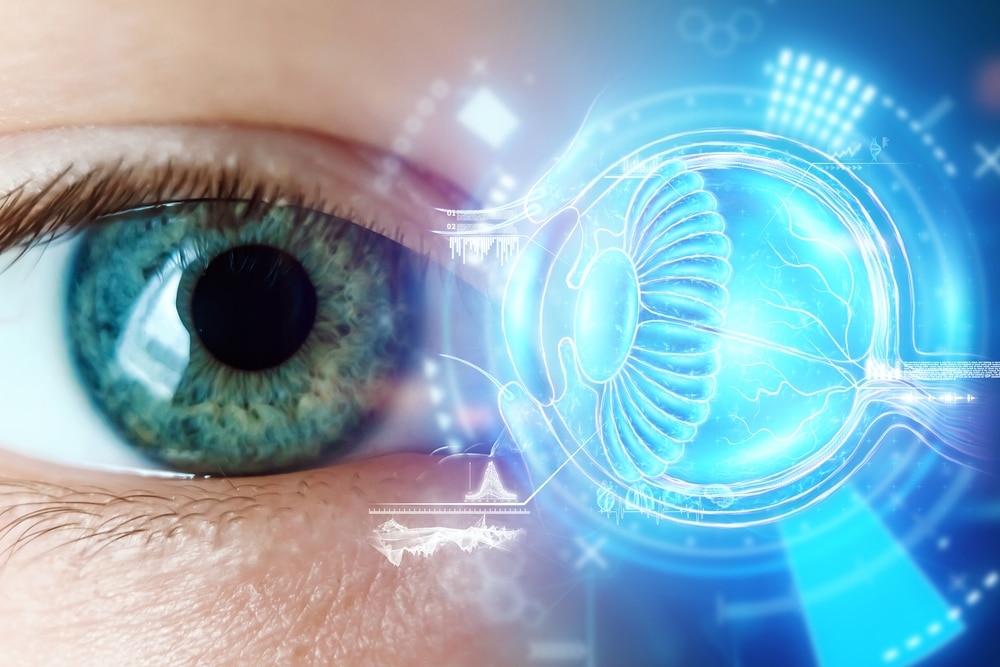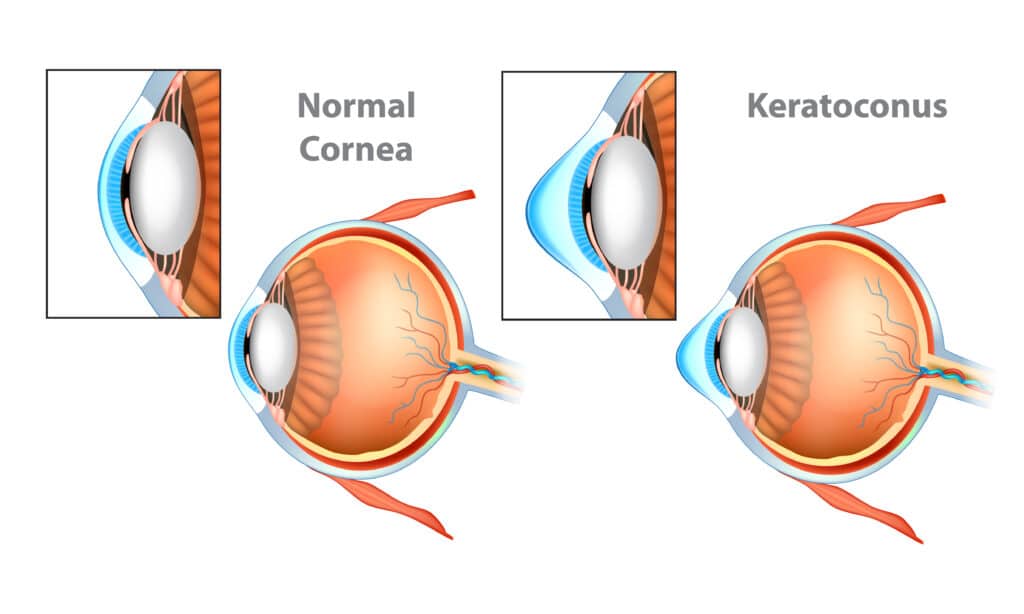What is Keratoconus?
Keratoconus, also known as a conical cornea, is an ocular disease that affects your cornea. Typically, your cornea is dome-shaped and is able to focus light through your eyes. When keratoconus occurs, your cornea becomes more cone-shaped, which prevents light from being focused correctly. This results in blurry and distorted vision that can affect your daily life.
Keratoconus Symptoms
Keratoconus moves slowly, usually starting in your late teens or early twenties, and can continue to develop over the span of ten to twenty years. It can affect both eyes, typically in different ways.
The symptoms in the early stage of keratoconus include:
- Mildly blurry vision
- Slightly distorted vision in which straight lines can seem bent or wavy
- Increased sensitivity to light
- Redness in your eye
- Swelling in your eye
The symptoms and indications of the later stages of conical cornea are:
- Increasingly distorted and blurry vision
- Increased near-sightedness or astigmatism, which results in needing to change your prescriptions often
- Your contacts no longer fit
What Causes Keratoconus?
It’s not fully known what exactly causes a conical cornea, but there are some common factors that are typically involved, including:
- Genetics
- Allergies
- Excessive eye rubbing
- Connective tissue disorders
Treatments for Keratoconus
The treatments for keratoconus vary, depending on what stage you’re in of the disease. For earlier stages of the disease, the problems caused by a conical cornea can be treated with prescription glasses and soft contact lenses. As it worsens, specialized hard contact lenses may be necessary.
This isn’t the only treatment, however. There are a couple of other options.
INTACS
INTACS, or implantable ring segments, involves a small curved device being implanted in your eye to help flatten the curvature of your cornea, helping to remove the cone shape and improving your vision.
Corneal Transplant
Corneal transplants are an option when your symptoms of keratoconus are severe. During this surgery, any damaged areas of your cornea will be completely replaced with healthy cornea tissue from a donor.
The final option is corneal cross-linking.
Keratoconus Cross-Linking
The corneal cross-linking treatment for a conical cornea has been in use since 1998. It’s an outpatient procedure that makes the cornea more rigid and less likely to deteriorate through a combination of UV lights and riboflavin.
During this procedure, numbing eye drops and a Valium tablet will be used for pain management. Then, the epithelium tissue of your eye will gently be removed, Photrexa Viscous eye drops will be applied for 30 minutes, and then your cornea will be exposed to 30 minutes of UV light while additional drops are used.
In order to be eligible for this treatment, it will need to be determined that your cornea is not too thin or scarred.
Can Keratoconus Cause Permanent Vision Damage?
While a conical cornea is not likely to cause complete vision loss, it can cause fairly severe permanent damage to your vision if it’s left untreated.
Talk to the Experts at Clear Choice LASIK

It is essential to start treatment when you start to suspect that you may have a conical cornea in order to prevent any further damage. The highly skilled team at Clear Choice LASIK offers a complimentary screening to see if our corneal cross-linking procedure is the right option for you.
Frequently Asked Questions
Who Is More Likely to Get Keratoconus?
Keratoconus often starts in the late teens to early 20s and progresses over time. While the exact cause is unknown, it is thought to be linked to genetics, frequent eye rubbing, and underlying conditions such as Down syndrome, Ehlers-Danlos syndrome, and sleep apnea.
How Do You Prevent Keratoconus in the Eye?
While keratoconus cannot be entirely prevented, avoiding frequent and aggressive eye rubbing may help reduce the risk or slow its progression. Early detection and monitoring are also key to managing the condition effectively.
Can Keratoconus Be Cured?
Keratoconus cannot be cured, but it can be managed. Depending on its severity, treatment options include glasses, specialty contact lenses, corneal cross-linking, or corneal transplant in advanced cases.
What Are the Symptoms of Keratoconus?
Common symptoms of keratoconus include blurry or distorted vision, frequent prescription changes, increased light sensitivity, and difficulty seeing at night. These symptoms typically worsen as the condition progresses.
How Is Keratoconus Diagnosed?
Keratoconus is diagnosed during a comprehensive eye exam. Doctors use advanced diagnostic technology to assess the shape and thickness of your cornea to determine if the disease is present and how advanced it is.
What Are the Treatment Options for Keratoconus?
Treatment options vary based on severity. Mild cases may be managed with glasses or soft contact lenses. Moderate to advanced cases may require scleral lenses, Intacs, corneal cross-linking, or even a corneal transplant.
What Is Corneal Cross-Linking for Keratoconus?
Corneal cross-linking is a procedure designed to halt the progression of keratoconus. It works by strengthening the corneal tissue through a combination of riboflavin (vitamin B2) drops and controlled UV light.
Can LASIK Correct Vision for People With Keratoconus?
LASIK is not recommended for patients with keratoconus. Because the cornea is already thin and irregularly shaped, LASIK could worsen the condition. Alternative treatments like cross-linking or specialty lenses are preferred.
What Is Keratoconus?
Keratoconus, also known as a conical cornea, is an ocular disease that affects your cornea. Typically, your cornea is dome-shaped and is able to focus light through your eyes. When keratoconus occurs, your cornea becomes more cone-shaped, which prevents light from being focused correctly. This results in blurry and distorted vision that can affect your daily life.
References
Boyd, K. (2022, November 8). What is keratoconus?. American Academy of Ophthalmology. https://www.aao.org/eye-health/diseases/what-is-keratoconus
Keratoconus. AOA.org. (n.d.). https://www.aoa.org/healthy-eyes/eye-and-vision-conditions/keratoconus















